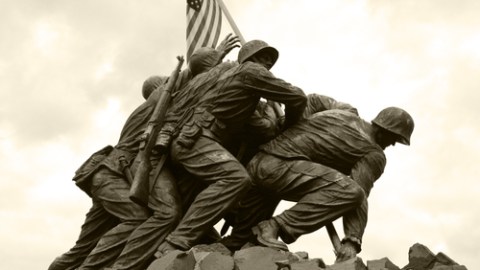Donald Rumsfeld: Support the Troops. Hire Them.

What’s the Big Idea?
In a recent column in The New York Times, Thomas Friedman asked the question “Why do we all jump up and applaud at N.B.A. or N.F.L. games when they introduce wounded Iraq or Afghan war veterans in the stands?”
According to Friedman, the military embodies the kind of civic idealism and sacrifice that is otherwise missing in “our hyperpartisan public life.” That might be a nice sentiment, but all too often all we do is cheer, as if veterans are there only to provide us with a nostalgic sense of what it means to serve one’s country.
We can do more, and need to do more.
Unlike past wars, such as World War II, veterans are not returning home to the same kind of low-cost mortgages, business loans, generous grants to attend college and other perks that helped the World War II generation build the strongest economy and largest middle class the world has ever known.
Instead, veterans are returning home to high unemployment — nearly 27 percent of male veterans 18 to 24 are unemployed — and high suicide rates. In fact, manyrecent studies have linked the two, as financial pressures have been found to be responsible for about 12 percent of suicides and attempted suicides.
There is therefore no better way to support our troops than to hire them into the civilian workforce. But don’t just hire them because it seems like a good, patriotic thing to do.
Donald Rumsfeld, former Secretary of State and author of the memoir Known and Unknown, says veterans bring something very important to the workforce. According to Rumsfeld, veterans are a self-selected group who have demonstrated initiative and who have also been given a lot of responsibility at a young age.
In the vide below, Rumsfeld describes why “people in the private sector will do themselves proud by bringing them onboard and bringing into their private institutions and organizations and businesses people with those skill sets.”
Watch the video here:
What’s the Significance?
While veterans possess valuable assets for the civilian economy, that value isn’t well understood. Part of this is because many people in the private sector simply aren’t aware of the skill set that veterans possess.
Another issue, that applies to anyone looking to transition from one field to another, is that it is nearly impossible to break through the military jargon on veterans’ resumes, so much so that even Rumsfeld, who has worked in both the military and civilian sectors, says “I can’t understand what it is they’ve done.”
Therefore, according to Rumsfeld, veterans need to rewrite their resumes in a way to make them “intelligible to the average citizen.”
Image courtesy of Shutterstock
Follow Daniel Honan on Twitter @Daniel Honan




